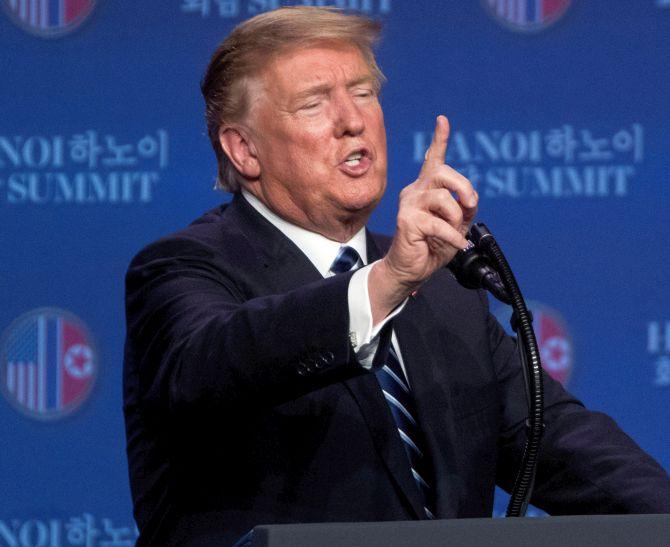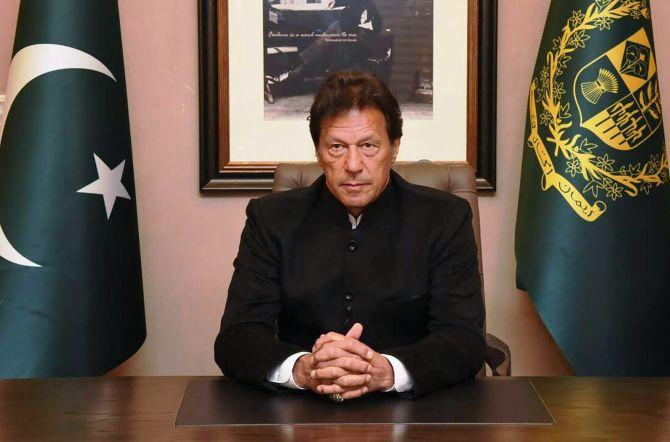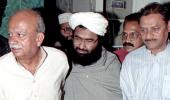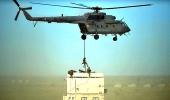'India, which climbed the escalation ladder first, has climbed down.'
'It remains unclear what Indian objectives have been realised in precipitating the crisis in the first instance last Tuesday,' notes Ambassador M K Bhadrakumar.

The crisis situation following the Indian bombing of Pakistani territory on February 26 -- described as 'intelligence-led' non-military pre-emptive action' against terror targets -- and the swift Pakistani retaliation the next day in the form of an aerial attack on military installations in Jammu and Kashmir, leading in turn to a 'dog-fight' in the sky, may be deemed to have blown over.
The visible part of the 'de-escalation' appeared in the afternoon of February 28 when Pakistan Prime Minister Imran Khan announced in the national assembly in Islamabad that an Indian pilot who was captured, was going to be returned.
In sum, the entire trauma got over in about sixty hours flat. The credit for this goes to prompt and sustained international intervention -- overtly by the US and Saudi Arabia and, perhaps, from behind the scene by China and the UAE.
There seems to be a quid quo pro that India will not retaliate against Pakistani jets crossing the Line of Control and attacking the Indian military assets in J&K, which, of course, are tantamount to an act of war.
An Indian military statement on Thursday (following Imran Khan's announcement) calmly drew the balance sheet when it stated in a carefully worded formulation that 'the Indian Army is committed to maintaining peace and stability in the region' and that the army is in a 'state of readiness to respond to any provocation by Pakistan.'
The wording seems to imply that it will be Pakistan's privilege entirely to escalate further.
Suffice to say, India, which climbed the escalation ladder first, has climbed down. It remains unclear what Indian objectives have been realised in precipitating the crisis in the first instance last Tuesday.
The Indian mantra has been that Pakistan should take 'immediate and credible action' to conclusively shut down all extremist organisations based in that country and involved in cross-border terrorism.
But Pakistan continues to be in denial mode. Time only will tell whether anything has changed in reality on the ground.
Most important, does India reserve the right to attack Pakistani territory on the plea that there is 'actionable intelligence' on likely terrorist activity?
Equally, is there a new Indian security doctrine that it is determined to retaliate if a terrorist attack takes place on its soil, by attacking Pakistan?
There are no easy answers. All this leads to a suspicion that Prime Minister Narendra Damodardas Modi might have used the entire contrived crisis atmosphere to drum up jingoism with an eye on the upcoming parliamentary poll.
Senior Opposition leaders think so and have accused Modi of 'blatant politicisation' of India's national security issues. Mamata Banerjee openly derided Modi that the Opposition does not need a war to win the forthcoming election.
Be that as it may, the crisis has major diplomatic ramifications, too. The intervention of friendly countries, which wield considerable influence over Pakistan, in defusing the crisis may have some enduring effect -- at least until the parliamentary elections in India get over in April-May.
Of course, any meaningful discussions between India and Pakistan will be possible only after the new government is formed in Delhi. The big question, therefore, is whether the 'cold peace' will hold until the middle of the year.
The good part is that the two countries which leveraged their big influence on Pakistan and intervened to defuse the crisis -- Saudi Arabia and the UAE -- happen to be stakeholders themselves insofar as they also have dynamic partnerships with India at the bilateral level.
Saudi Crown Prince Mohammed bin Salman, who visited Delhi last week, underscored grandiose plans to invest $100 billion in the Indian economy.
Something of this historic shift in the South Asian power dynamic is also visible in the unprecedented invitation extended by the half-century old Organisation of Islamic Conference to India to be the 'guest of honour' at its foreign minister level meet in Abu Dhabi on March 1-2.
Traditionally, OIC, which incidentally has a 'contact group' on Kashmir, used to berate India and openly side with Pakistan. Notably, the grouping's overture to India carries the Saudi imprimatur and UAE backing.
There is a tantalising possibility indeed that External Affairs Minister Sushma Swaraj will follow up on the Saudi-Emirati diplomacy with Pakistan.
Reports say Saudi Minister of State for Foreign Affairs Al-Jubeir is heading for Islamabad on Friday and that the Saudi ambassador to India had met Modi previously.
Again, if there has been angst in the Indian mind that the US is beholden to Pakistan for its help in advancing the Afghan peace talks involving the Taliban, the Trump administration may have dispelled it in large measure through last week, thanks to its vociferous support of India in the present crisis with Pakistan.
This must be counted as an exceptionally rare occasion where the US unambiguously, categorically and repeatedly voiced its support for India and demanded that Pakistan should shut down the terrorist activities directed against India.
Clearly, the White House played a forceful role at the diplomatic level to defuse the crisis. In fact, President Trump openly admitted it.
In the overall US regional strategies, partnership with India is a top priority and the Trump administration did well to seize the opportunity to reiterate it beyond doubt at a juncture when Delhi needed it most. This will inject new verve into the US-Indian strategic partnership.
Equally, Delhi can take satisfaction that the joint communique issued after the Russia-China-India format at the foreign minister level following the meet in Zhejiang on February 27 contained a thinly-veiled reference to the issues of terrorism that India has been facing. It said specifically:
'The Ministers stressed that those committing, orchestrating, inciting or supporting terrorist acts must be held accountable and brought to justice in accordance with existing international commitments on countering terrorism, including the UN Global Counter-Terrorism Strategy, relevant UN Security Council resolutions and the FATF standards, international treaties, including on the basis of the principle "extradite or prosecute" and relevant international and bilateral obligations and in compliance with applicable domestic legislation.'

Indeed, these are Indian demands against Pakistan. Nonetheless, it is too early to say whether under constant Indian urgings and some quiet advice from the Russian side, the Chinese stance on Pakistan-supported terrorism could also be changing.
Much speculation is going on in this regard. Of course, if at all there is going to be any change in the Chinese stance, it can only happen at glacial pace.
China cannot and will not take a stance against Pakistan.
But below that threshold, it can play a unique role, somewhat similar to Saudi Arabia or the UAE's but much more effective and longstanding in its effect, to encourage Pakistan to work toward a modus vivendi with India.
If that happens, there has been a greater logic in the Indian madness to climb up a few notches on the escalation ladder vis-a-vis Pakistan.
For the present, with his magnanimous gesture to release the Indian pilot as a 'gesture' of peace and his offer to meet Modi, Imran Khan walks away as a statesman, while Modi looks somewhat provincial.










